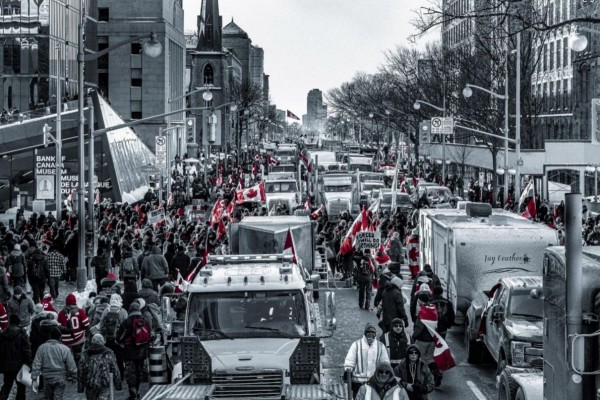-

Red scare on the federal campaign trail
Whether Ben Carr likes it or not, the Communist Party of Canada will remain in this struggle for more popular democracy, as we have unflaggingly for generations. No aspersions can revise that record, and no bubble can keep us from wielding these freedoms we are proud to defend.
-

Delusions and paranoia in NATOland
What does windfall spending on NATO do for Canada’s national security? As the militarization of the North proceeds against an inflated eastern threat, eroding Canadian sovereignty through Cold War aerospace programs such as NORAD, it remains difficult to portray Canada’s increasingly assertive global deployments as a matter of national defence.
-

Israel’s drone age
Israel’s drone assassination of Hamas commander Saleh al-Arouri is a straightforward study in the fly-by-night legality of drone warfare, and shows that Israel is both a leader and transgressor of rapidly changing legal norms. As Cam Scott writes, for more than two decades, drones have assumed a very nearly governmental role in, and above, the Occupied Territories.
-

Broad front or false front?
On February 19, no fewer than 1,000 protestors converged in Washington, DC for the Rage Against the War Machine rally, in opposition to the escalation of US support for the war in Ukraine. Slickly packaged and backed by a motley of reactionary groups and individuals, the event was better marketed than attended, as an attempt at “left-right unity” against a heavily propagandized war.
-

What was the Freedom Convoy?
It’s been a dizzying few weeks in Canadian politics. As the Emergencies Act is revoked, the trucks roll out of Ottawa, and provincial governments across Canada capitulate to the demands of the Freedom Convoy, dropping mask and vaccine mandates like dominoes, one could be forgiven for asking once more: what just happened, and what do we continue to do about it?
-

The perils of left populism
In a recent piece for The Breach, writer and organizer Emma Jackson calls for an “expansive left populism” to defeat the far-right. While she identifies many of the fronts on which the left must fight, it remains unclear how populism as such should serve as a working program for broad left demands, given its susceptibility to the politics of reaction.
-

Why vote Communist?
Where every other party is obliged to broker the interests of working class and colonized people to the grand abstraction of ‘The Economy,’ balancing corporate interests with the best of their respective platforms, the Communist Party of Canada can confidently name the profit system that dispossesses all, however differently—of land, of lifetime, of the wealth that we incessantly create.
-

Trump’s 1776 Commission: Cultural renewal by political repression
The evangelical vision of the 1776 Commission—one of cultural renewal by political repression—hasn’t been put quite so plainly since the Reagan years, nor has it gone to such lengths to enumerate its enemies this century. But what is the meaning of this moribund commission and its program for social cohesion, now that Trump is on his way out?
-

Canada’s housing strategy needs a reset—human rights and public ownership, not markets
For as long as Winnipeg and other Canadian cities passively choose not to house people, they actively affirm and secure the right of developers and landlords to profit from inequality. Housing is a human right, not a commodity, and the consumer model of tenancy isn’t working. The only way to truly guarantee that people have high-quality, affordable housing is through public ownership.
-

American Dharma does the devil’s work too well
What good is American Dharma for politics? Superficially, the film draws back the curtain on a cynical campaign that far exceeds the influence of the presidency in its implication, having commenced when Donald Trump was a cavorting Democrat. But this is only Bannon’s résumé, and Morris does little to push back against his leading man’s perception of himself as a clandestine kingmaker.



